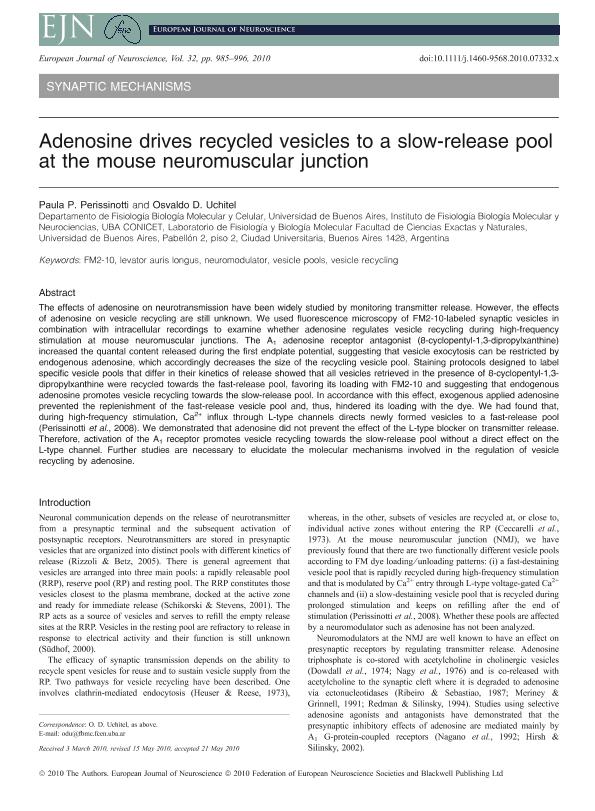Artículo
Adenosine drives recycled vesicles to a slow-release pool at the mouse neuromuscular junction
Fecha de publicación:
08/2010
Editorial:
Wiley
Revista:
European Journal Of Neuroscience
ISSN:
0953-816X
Idioma:
Inglés
Tipo de recurso:
Artículo publicado
Clasificación temática:
Resumen
The effects of adenosine on neurotransmission have been widely studied by monitoring transmitter release. However, the effects of adenosine on vesicle recycling are still unknown. We used fluorescence microscopy of FM2-10-labeled synaptic vesicles in combination with intracellular recordings to examine whether adenosine regulates vesicle recycling during high-frequency stimulation at mouse neuromuscular junctions. The A1 adenosine receptor antagonist (8-cyclopentyl-1,3-dipropylxanthine) increased the quantal content released during the first endplate potential, suggesting that vesicle exocytosis can be restricted by endogenous adenosine, which accordingly decreases the size of the recycling vesicle pool. Staining protocols designed to label specific vesicle pools that differ in their kinetics of release showed that all vesicles retrieved in the presence of 8-cyclopentyl-1,3-dipropylxanthine were recycled towards the fast-release pool, favoring its loading with FM2-10 and suggesting that endogenous adenosine promotes vesicle recycling towards the slow-release pool. In accordance with this effect, exogenous applied adenosine prevented the replenishment of the fast-release vesicle pool and, thus, hindered its loading with the dye. We had found that, during high-frequency stimulation, Ca2+ influx through L-type channels directs newly formed vesicles to a fast-release pool (Perissinotti et al., 2008). We demonstrated that adenosine did not prevent the effect of the L-type blocker on transmitter release. Therefore, activation of the A1 receptor promotes vesicle recycling towards the slow-release pool without a direct effect on the L-type channel. Further studies are necessary to elucidate the molecular mechanisms involved in the regulation of vesicle recycling by adenosine.
Palabras clave:
Fm2-10
,
Levator Auris Longus
,
Neuromodulator
,
Vesicle Recycling
Archivos asociados
Licencia
Identificadores
Colecciones
Articulos(IFIBYNE)
Articulos de INST.DE FISIOL., BIOL.MOLECULAR Y NEUROCIENCIAS
Articulos de INST.DE FISIOL., BIOL.MOLECULAR Y NEUROCIENCIAS
Citación
Perissinotti, Paula Patricia; Uchitel, Osvaldo Daniel; Adenosine drives recycled vesicles to a slow-release pool at the mouse neuromuscular junction; Wiley; European Journal Of Neuroscience; 32; 6; 8-2010; 985-996
Compartir
Altmétricas




